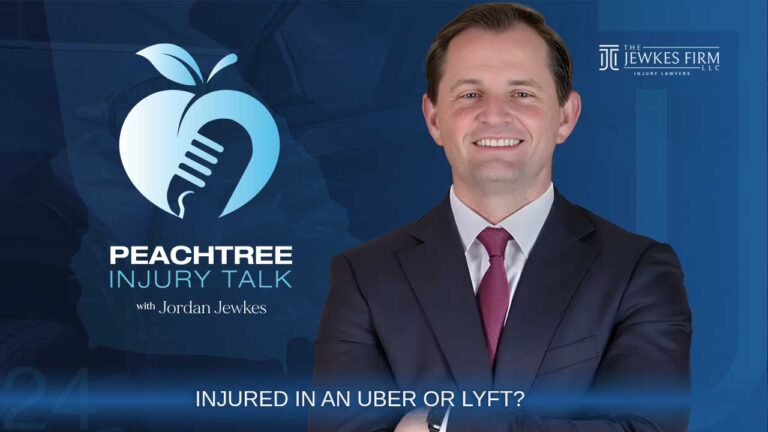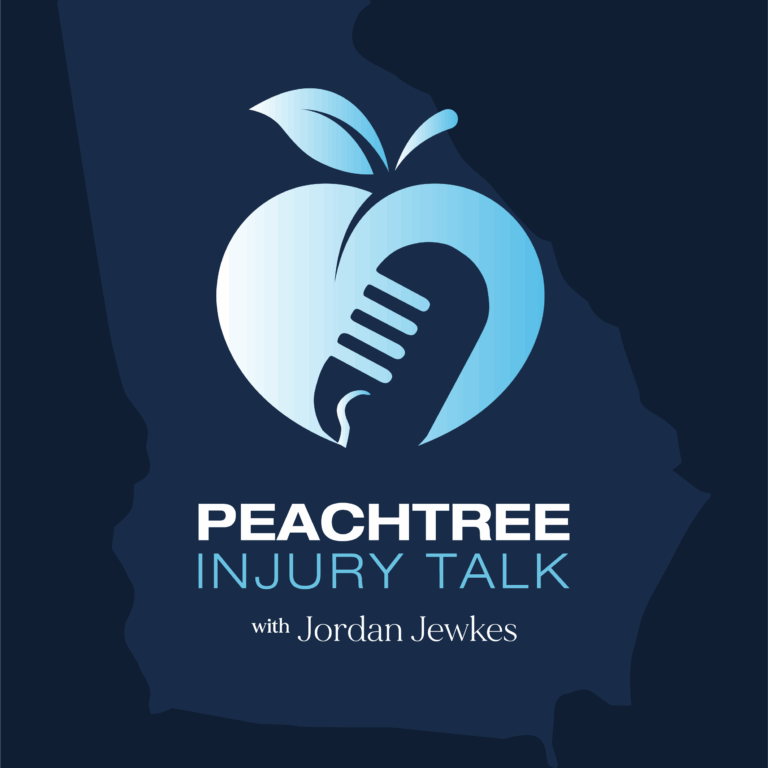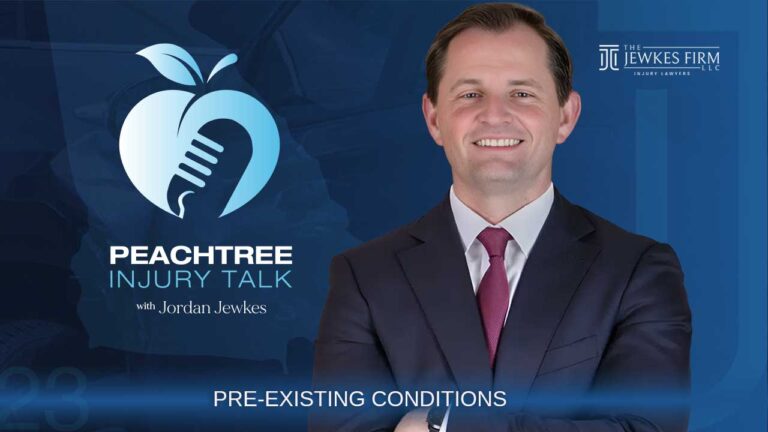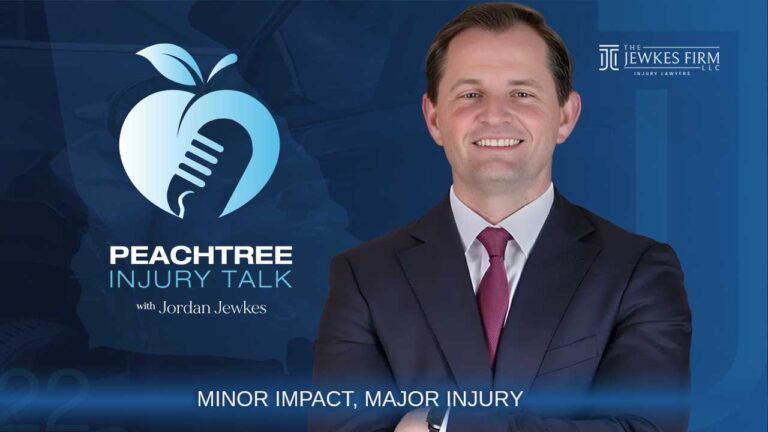
Injured in an Uber or Lyft? What Georgia Riders Should Know
In this episode of Peachtree Injury Talk, attorney Jordan Jewkes discusses the legal complexities surrounding accidents involving rideshare services like Uber and Lyft. He explains
Home | Podcasts | Peachtree Injury Talk | Delayed Pain After an Accident — What If You Don’t Feel Hurt Right Away?
Peachtree Injury Talk with Jordan Jewkes
In this episode of Peachtree Injury Talk, attorney Jordan Jewkes discusses the common issue of delayed pain following car accidents. He explains that symptoms often don’t appear immediately due to factors like adrenaline and inflammation, especially with spine, head, neck, and lower back injuries. Delayed pain is normal and can occur days or even weeks after the incident. Jewkes emphasizes the importance of seeking medical attention as soon as symptoms arise to document the injury and support any personal injury claim. While insurance companies may challenge claims if treatment is delayed, being honest and obtaining timely care can protect a victim’s rights. Jewkes advises anyone experiencing pain after an accident to get evaluated promptly, starting with urgent care or a primary doctor if specialists aren’t immediately available. The episode encourages viewers to understand their rights and seek legal help through Jewkes’ firm if needed.
| 00:00 | Narrator: Welcome to Peachtree Injury Talk with attorney Jordan Jewkes. |
| 00:04 | Mike Leon: Hi everyone, and welcome to a brand new episode of Peachtree Injury Talk with Jordan Jewkes. I’m your host, Mike Leon. Today, we’re discussing delayed pain after a car accident—why it happens, what it means for your claim, and what steps you should take if symptoms appear days later. Jordan has been a strong advocate for injured victims, fighting against a system that is often unfair. He’s a seasoned trial lawyer and former injury defense attorney, giving you expert insider knowledge to help fight for your injuries. Jordan, let’s dive right in. Why do some injuries not show up immediately after a car accident? |
| 00:46 | Jordan Jewkes: Thanks for having me, Mike. This is a common question. The simple answer is every case is different. Every accident affects each person’s body uniquely. For example, if four people are in the same car that is rear-ended by a truck, each person might experience pain in different areas and at different times. Sometimes symptoms don’t appear until hours or even days later. This is especially common with spine and head injuries. For instance, adrenaline or inflammation can delay the onset of pain for 24 to 48 hours after the incident. |
| 02:00 | Mike Leon: That’s a great point. Besides the spine and head, what other injuries commonly show delayed symptoms? |
| 02:10 | Jordan Jewkes: The most common areas are the neck and lower back. Head injuries, especially brain injuries, can also be difficult to detect right away—sometimes symptoms take days or even weeks to appear. Shoulder and hip injuries also tend to show up later. Everyone's body reacts differently. A good analogy is getting a bruise. You might feel a hit but not see the bruise until days later. You might think you’re fine initially but later realize medical treatment is needed. |
| 03:18 | Mike Leon: I feel that! I played basketball yesterday and am feeling it today. |
| 03:22 | Jordan Jewkes: Exactly! Also, as we get older, our bodies change—ligaments tighten, muscles get sore after activities we initially felt fine doing. So delayed pain is very normal. |
| 03:55 | Mike Leon: So what about those who don’t seek treatment immediately? Does waiting to see a doctor hurt their personal injury case? |
| 04:03 | Jordan Jewkes: The short answer is it shouldn’t, as long as you seek treatment when you do feel pain. Unfortunately, insurance companies often argue that a delay in treatment means you weren’t really injured. They’ll say things like, “You were in an accident Monday but didn’t see a doctor until Thursday or later—so your injury isn’t real.” That’s standard insurance company strategy. But it’s important to be honest and accurate about what happened. Most people, including potential jurors, understand delayed pain because they’ve experienced or seen it before. Many people, especially men, tend to downplay pain, take over-the-counter remedies, and keep going to work without complaining. Others, like women or caregivers, often don’t want to make a fuss until it’s necessary. That’s normal and understandable. |
| 06:18 | Mike Leon: So if symptoms show up days or weeks later, what should a person do? |
| 06:23 | Jordan Jewkes: They should seek medical care immediately once symptoms appear. Getting prompt medical documentation is key—it shows you were in an accident and now have symptoms related to it. If weeks have passed without treatment, it can be harder to prove injury to an insurance company, but you should still get checked out. Regardless of claims, your health is the priority. |
| 07:39 | Mike Leon: Can a person still file a claim if they didn’t go to the hospital right after the accident? |
| 07:43 | Jordan Jewkes: Yes, they can. Insurance companies may try to deny or reduce the claim using delayed treatment as an excuse, but don’t let that stop you. A good attorney can explain the situation to insurance adjusters and juries. Honesty is crucial. Being truthful about when symptoms appeared helps maintain your credibility. You might say, “I didn’t think it was serious at first, but when the pain didn’t go away, I got treatment.” |
| 09:01 | Mike Leon: Great advice. What’s the best overall advice you’d give someone unsure if they’re injured after a wreck? |
| 09:04 | Jordan Jewkes: If you’re unsure and have any pain at all, get it checked out by a doctor. At minimum, you’ll have documentation of your accident and symptoms. Early evaluation allows doctors to run tests like x-rays and catch injuries sooner. It also helps with your case later on. If you wait weeks, it’s harder to connect the injury to the accident. Keep in mind, getting in to see a specialist quickly can be difficult since they usually have a several-week wait for new patients. That’s why many start at urgent care, with a chiropractor, or with their primary care physician—they can usually see you within a day or two after the accident. |
| 10:17 | Mike Leon: Jordan, thanks so much for your time and valuable insights. |
| 10:19 | Jordan Jewkes: Thanks, Mike. I appreciate being here. |
| 10:22 | Mike Leon: And thank you all for tuning into Peachtree Injury Talk. If you were recently in a car accident and symptoms started showing up—even if the crash seemed minor—don’t wait. Visit jewkesfirm.com [spelled J-E-W-K-E-S] to connect with Jordan and his team. They’re here to help you understand your rights and fight for what you deserve. Be sure to like, subscribe, and leave us a review. We’ll see you next time! |
| 10:49 | Narrator: Thanks for watching. Be sure to hit that like and subscribe button and leave us a review in the comments. |

Peachtree Injury Talk is a podcast by Kevin Rosenquist featuring legal insights and practical advice from Georgia-based attorney Jordan Jewkes. The show focuses on personal injury law, offering listeners expert guidance on navigating insurance claims, understanding legal processes, and protecting their rights after an accident. Each episode dives into real-life case examples, common challenges injured individuals face, and actionable tips for dealing with insurance companies and legal hurdles.
Episode Summary
In this episode of Peachtree Injury Talk, attorney Jordan Jewkes discusses the legal complexities surrounding accidents involving rideshare services like Uber and Lyft. He explains that liability typically depends on who is at fault and that rideshare companies provide substantial insurance coverage—usually around $1 million—when their drivers are operating with the app active. Jordan emphasizes the importance of immediately calling 911, seeking medical care, documenting the accident scene, and avoiding private settlements with drivers. He also highlights challenges in suing Uber or Lyft directly due to the independent contractor status of drivers and the prevalence of mandatory arbitration clauses. For passengers, drivers, or pedestrians involved in rideshare accidents, Jordan advises caution and thorough documentation to ensure proper insurance claims and compensation.
Timestamps
00:00 – Introduction to Peachtree Injury Talk
00:10 – Overview: Ride Share Accident Liability
00:39 – Determining Legal Responsibility and Insurance Liability
01:49 – Insurance Coverage for Passengers in Georgia
02:47 – Filing Claims and Insurance Layers for Ride Share Accidents
03:52 – Steps to Take Immediately After a Ride Share Accident
04:35 – Advice for Pedestrians and Bicyclists Hit by Ride Share Vehicles
05:39 – Common Mistakes After Ride Share Crashes
06:50 – Can Uber or Lyft be Sued Directly in Georgia?
08:11 – Complexities in Handling Ride Share Accident Cases
09:55 – Safety Tips for Ride Share Users in Georgia
10:58 – Closing and Contact Information
About the Show
Peachtree Injury Talk is hosted by attorney Jordan Jewkes, who is dedicated to giving injury victims a voice and fighting for their rights against an often unfair system. Each episode provides valuable legal insights and practical advice for those navigating personal injury claims.

Delayed Pain After an Accident — What If You Don’t Feel Hurt Right Away? focuses on the important topic of delayed pain following car accidents—why some injuries don’t show symptoms immediately, the implications for personal injury claims, and the steps victims should take when delayed symptoms appear.
Jordan Jewkes, an experienced trial lawyer and former injury defense attorney, explains that injuries from car accidents can manifest differently for each individual. While some victims feel pain immediately, others may not notice symptoms until hours or even days later. This is common for injuries involving the spine and head due to factors like adrenaline and inflammation that can temporarily mask pain for 24 to 48 hours after the accident. Likewise, neck, lower back, shoulder, and hip injuries may take time to become apparent, mirroring the way bruises can surface after an initial impact.
Mike and Jordan also discuss how factors such as age can influence how quickly people feel pain. Older individuals might experience delayed soreness or tightness due to natural changes in ligaments and muscles. This variability means that delayed pain is a normal response rather than evidence of a lack of injury.
A critical topic covered is the impact of delayed medical treatment on a personal injury claim. Insurance companies often use delays in seeking treatment as grounds to deny or diminish claims, arguing that the injury is not genuine if medical care is not sought immediately. However, Jordan emphasizes that delayed treatment should not automatically harm a claim as long as the person eventually receives medical evaluation once symptoms arise. Honesty is essential; victims should truthfully explain when symptoms began and when they sought treatment. Most jurors can relate to or understand why pain might be initially downplayed, especially as many people—particularly men—tend to minimize discomfort or rely on over-the-counter remedies before seeking professional help.
For anyone experiencing symptoms days or weeks after an accident, Jordan advises seeking medical care promptly. Timely medical documentation is critical for both health and legal reasons, as establishing a clear link between the accident and injuries can become more difficult over time. Even if doctors delayed treatment, victims still have the right to file claims.
Regarding medical care, Jordan notes that seeing a specialist immediately can be challenging due to wait times. Start with urgent care, a chiropractor, or a primary care physician for a quick evaluation after an accident.
Overall, the episode gives clear key advice: if you experience any pain following a crash—even if it does not appear immediately—get examined by a healthcare professional as soon as possible. This early intervention protects one’s health and strengthens any potential legal claim. The podcast concludes with encouragement to contact Jordan Jewkes’s firm for legal help and a reminder to subscribe and engage with the show.
In summary, the episode educates listeners on the reality and legitimacy of delayed pain after car accidents, addresses common insurance tactics, and empowers victims with practical guidance on protecting their health and legal rights. For more information, reach out to The Jewkes Law Firm at (770) 771-5130.
This show is designed to deliver general information regarding the law. Our guests will not provide tailored legal advice. If you have a personal issue and need legal support, get in touch with us for a free consultation with a Jewkes Firm attorney.
Subscribe to our newsletter for essential updates and expert legal advice.

In this episode of Peachtree Injury Talk, attorney Jordan Jewkes discusses the legal complexities surrounding accidents involving rideshare services like Uber and Lyft. He explains

In this episode of Peachtree Injury Talk, attorney Jordan Jewkes discusses the impact of pre-existing conditions on injury claims. A pre-existing condition is a medical

In this episode of Peachtree Injury Talk, attorney Jordan Jewkes from the Jewkes Firm discusses the reality of injuries resulting from low-speed car accidents. Despite
The information you obtain at this site is not, nor is it intended to be, legal advice. You should consult an attorney for advice regarding your individual situation. Contacting us does not create an attorney-client relationship.
